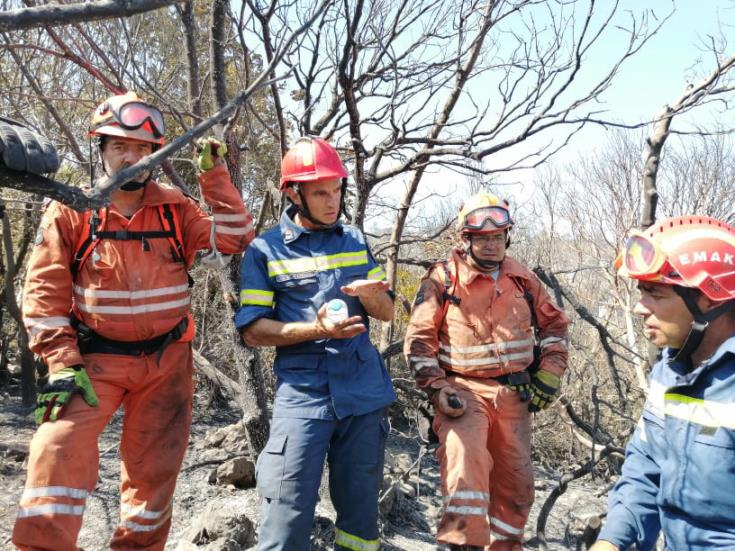Four Cyprus Civil Defence members and an injured firefighter will return home from Greece after a week battling wildfires burning across the country, while the rest of the mission will take a well-earned break.
Civil Defence Spokeswoman Olivia Michaelidou tweeted the “Cypriot mission will continue its activities with the remaining 35 members, two fire trucks and two Department of Forest planes”.
Meanwhile, the Cyprus mission remained in northern Evia on Tuesday night after working all day in the region.
They are expected to be ferried to Athens for rest and to receive new instructions.
Fire Service spokesman Andreas Kettis tweeted that the “Cypriot delegation will take a break after a week-long effort fighting the blazes”.
As the worst of Greece’s massive wildfires were being tamed, the country’s civil protection chief defended the firefighting efforts, saying every resource was thrown into the battle.
Nikos Hardalias said authorities “truly did what was humanly possible” against blazes that destroyed tens of thousands of hectares (acres) of forest and hundreds of homes, killed a volunteer firefighter, and forced more than 60,000 people to flee.
Two other firefighters were in intensive care with severe burns.
“We handled an operationally unique situation, with 586 fires in eight days during the worst weather conditions we’ve seen in 40 years,” Hardalias told a news conference.
“Never was there such a combination of adverse factors in the history of the fire service.”
Climate change
Greece had just experienced its worst heatwave since 1987, which left its forests tinder-dry.
Scientists say there is little doubt that climate change from burning coal, oil, and natural gas is driving extreme events.
The worst blaze still burning is in the northern section of Evia, Greece’s second-largest island, linked by a bridge to the mainland north of Athens and is a favourite holiday destination for the Greek capital’s residents.
Nearly 900 firefighters, 50 ground teams and more than 200 vehicles were fighting the blaze that broke out on August 3.
They included crews from Ukraine, Romania, Serbia, Slovakia, Cyprus and Poland — part of a huge international response to Greece’s plea for assistance.
Fourteen helicopters provided air support Tuesday on Evia, including three from Serbia, two from Switzerland and two from Egypt.
The wildfire on Evia was burning in an area in which villages and forests are entwined.
Hardalias said all the fire fronts on Evia were waning, but firefighters were guarding the blaze’s perimeter.
According to EU wildfire data and satellite imagery, more than 49,000 hectares (121,000 acres) have burned up on Evia — by far the worst damage from any recent fires in Greece.
Several other wildfires were burning in the country, with the most significant in the southern Peloponnese region, where new evacuations were ordered.
About 400 firefighters, including the Czech Republic and Britain teams, battled that blaze, assisted by five helicopters and 23 water-dropping planes from several countries.
A judicial investigation is underway into the causes of the fires, including any links to criminal activity.
Several arson suspects have been arrested.
Residents and local officials on Evia have complained about a lack of water-dropping planes in the early stages that they say left the fire to grow to such proportions that flying became too hazardous.
Hardalias argued that when the Evia blaze broke out, authorities were already facing other enormous challenges.
A major forest fire was burning through the northern outskirts of Athens, forcing the evacuation of thousands, and another was coursing through villages towards ancient Olympia — a hugely important archaeological site in the Peloponnese where the ancient Olympic Games were held for more than 1,000 years.
“Every house lost is a tragedy for all of us. It’s a knife in our heart.”
“Whether we could have done something different remains to be seen,” he said.
“But in any case, we fought a great battle, and the losses were among those fighting it, not among civilians.”
Critics say the government’s focus on evacuating villages prevented villagers with local knowledge from helping firefighters and led to more property destruction. (agencies)










